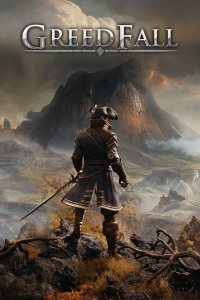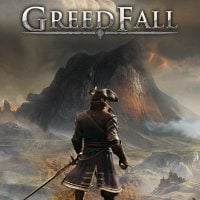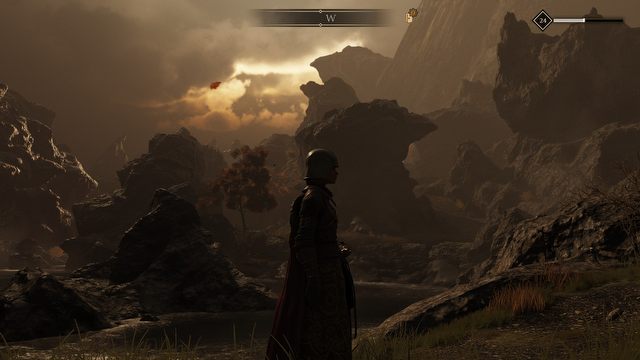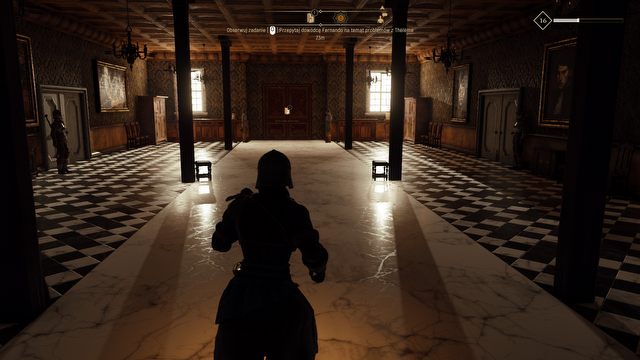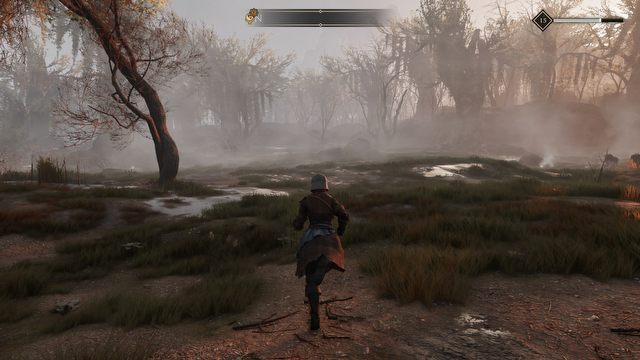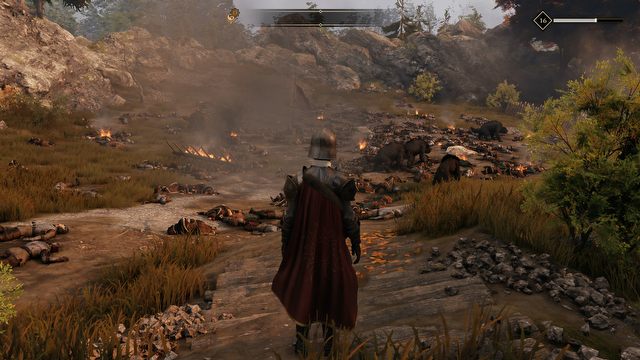GreedFall Review - Budget Witcher 3 That Simply Works
GreedFall is not a stiff spiritual successor to Gothic series. It's a well-designed unique role playing game developed with a limited budget and some great ideas borrowed straight from the best titles of this genre.
The review is based on the PC version.
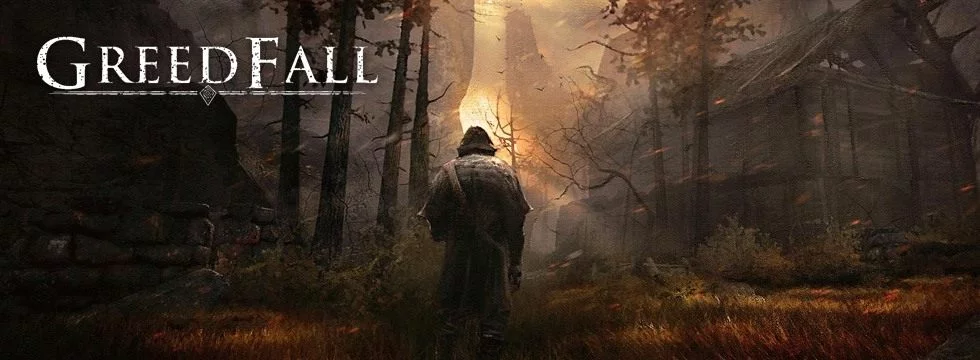
Have you ever experienced a situation when you noticed a show or class B movie that aired on TV while you were busy with something else? After the initial lack of interest, or even disgust, it suddenly turned out that such a movie with unknown actors sucked you in so badly that you have finally decided to watch it until its ending credits? GreedFall provided me with just such a variety of experience. At first it seemed feeble and clumsy, but the further I got into the forest the more exciting and rewarding it was. And literally, because autumn woods presented in GreedFall look truly amazing.
I could describe the new game of Spiders studios as a budget version of The Witcher 3, combined with rpg elements known from BioWare' titles and by saying so I don't mean it's some sort of cliché production. GreedFall doesn't look like a cheap substitute of third installment of The Witcher. It's rather an example of how a student tries to catch up and overpass his master. Inspired by a lot of good ideas, "Spiders" simply created the best game they could. It doesn't matter if it's not enough to call it perfect. Most bugs will disappear from your sight over time, obscured by the role-playing essence – immersive story and requirement of thorough character development.
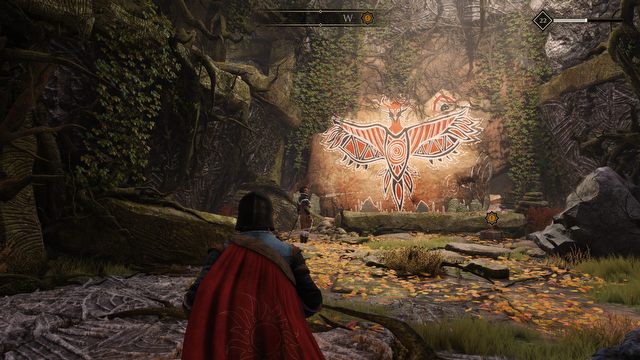
Some quests are not related with combat, but about gathering information. They expand your knowledge about game's lore.
A FEEL OF EMPTINESS AFTER THE FINAL CREDITS – FINALLY!
GreedFall is a representative of endangered genre which can be perceived as "finite" games, which have a definitive ending after you complete the main story. We receive a complete story, a satisfying ending, and after the credits game simply takes you back to main menu with a clear "this is it!" message with a "thank you for your attention". There is no open seamless world here, where you freely explore the game after the main story is over. So, you can't finish additional quests or travel through unknown areas – in the era of "games as services" I really liked this approach.
However, you should keep in mind that if you want to complete the whole game in 100%, it is worthwhile to focus on main and side quests (in form of short tasks gathered from a bulletin board) or simply save your game quite often. GreedFall does not indicate ‘points of no return’ in any possible way so you may lose a chance to complete some quests.
From dissatisfaction to delight
- well-written, extensive storyline with an exciting action twists, choices, political struggles and unique lore;
- strong emphasis on character development, where you need to distribute skill points very carefully, because one playing style excludes other options;
- interesting side quests with rich storyline backgrounds;
- no blank and useless world fillers;
- companions (team members) are not a simple supportive force in combat but a full-time characters with unique past, own views, personalities, and have significant impact on the plot;
- magnificent visuals of environments, landscapes and urban architecture.
- omnipresent "copy-and-paste", especially in the aspect of building interior design;
- bulky fast travel system;
- slightly overlong ending part of the storyline;
- some side characters seem to be more interesting than lead characters;
- small number of types of opponents;
- lots of technical bugs and a lack of general polishing.
The beginning was difficult and GreedFall seemed to do everything in order to discourage me from further playing. First, we were bombarded with cutscenes with ugly faces of characters similar to early Xbox 360 titles, and then a showcase of various quests in the city looked a bit tedious. The dialogues were a little overwhelmed with words, animations seemed stiff, and the game world itself appeared to be quite uncoherent mess – the petty township of colonial times versus strange mutations of bears and rhinoceroses, and even monsters assembled from tree branches.
After a few hours of digging into the universe of GreedFall, I slowly started to drag myself in. A storyline depicting the search for a cure for pandemic plague turned out to be interesting, sensible and very well written. Devs from Spiders Games did not limit themselves to merely a simple tale, but instead they've created a complex storyline, which contains interesting mythology of local population and political issues of prevailing colonizers.
In GreedFall, we embark on a journey through the island of Teer Fradee, conquered by several different factions from the "old world". On the one hand, we have prosperous and highly developed cities, on the other, we have marginalized natives. The latter, in order to defend themselves against the destructive power of civilization, have awakened ancient beasts and demons. Every faction has its own goals and interests and the same applies to every character. So, we must find our way around this, risking our reputation with one or the other.
The progressive exploration of the island's history and the major conflict between old and new order seems to be the most interesting part of the plot, especially since a lot of space has been devoted to local mythology and political struggles. I think that game designers have deliberately put more emphasis on the game world, even instead of main characters, who are not very memorable. GreedFall is definitely a story about the island of Teer Fradee itself – not about the hero of Congregation of Merchants named De Sardet (whom we control), or about his cousin Constantin.
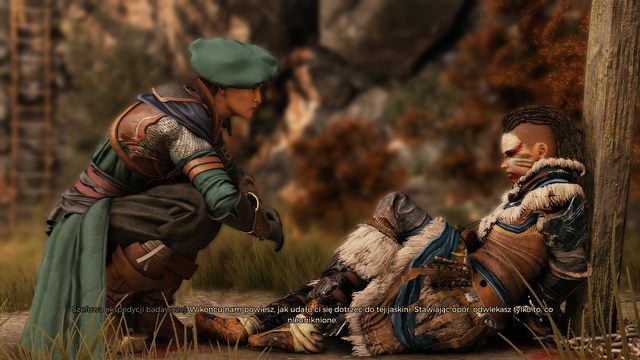
A story presenting the history of the natives and their mythology is one of the stronger points of the game.
FICTION BASED ON FACTS
Although the world of GreedFall is fictional, it is quite easy to find references to real countries or organizations. The congregation of merchants was based on France and Italy, the religious Theleme on the Spaniards, the Bridge Alliance on the Ottoman Empire, the Coin Guards resemble the heavy army of Landsknecht, and the Nauts are sailors from times when a strong state must have had a huge fleet. The natives, in turn, probably were inspired by the Indian tribes which were systematically repressed by European invaders.
RPG in The Witcher 3 style
The history of the island and its current situation is revealed by well-written quests. The fearsome Ubisoft question markings scattered around the map are only marker points for fast travel. After you take a quest, even a side task, it usually is a result of long conversation and it has interesting story context, which expands your knowledge about game' lore and its universe. The same rules apply even for collectibles! Short, small tasks consisting in killing some beast prowling the road are also present, but they occur very rarely on the quest boards. GreedFall clearly picks up a handful of ideas from The Witcher 3 and does it very well.
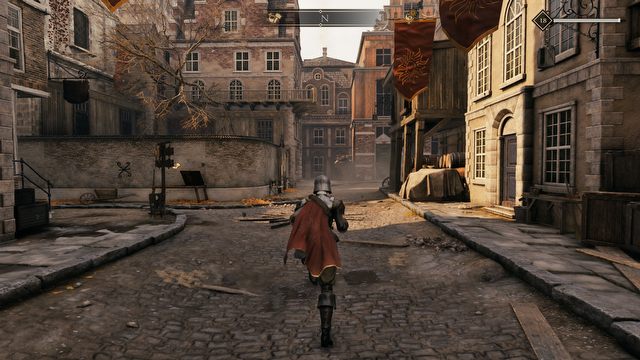
Just like forests and mountains, the streets of cities look very well. It is a pity that they lack some crowds from Assassin's Creed.
A BIT OF INSPIRATION IS NOT THAT BAD
There are many slighter rip offs and features taken directly from the adventures of Geralt The Witcher. The main character, De Sardet, carries two swords (or axes) – standard one, and other for destroying enemy armor. During combat he can use potions and enhance weapons with alchemical substances. We kill monsters during quests collected from bulletin boards and conduct investigations by following trails and tracks (but fortunately without switching to the Witcher's or Batman's sense!). The inspirations can also be noticed in user interface: health bars carefully divided into segments, or a similar icon of a reversed vial of currently used potion.
Important role of our team reminds well-known titles by BioWare. We meet and recruit new party members with time, and each of them has his/her own rich background and optional, long companion quest to complete.
The fact that everything is a subject to the story may be a result of some technical limitations. GreedFall is not a game with an open world where you can do what you want. In towns and villages you can only enter rooms associated with specific tasks. Also, you can't kill all NPCs, but just enemies. In many areas you can encounter on invisible walls which means that you can only travel through pathways prepared by game devs. However, I never considered this as a flaw in the game. This is rather an advantage, thanks to which you can immerse yourself more deeply in the plot, without the distractions typical to open-world titles.
Narrow character development
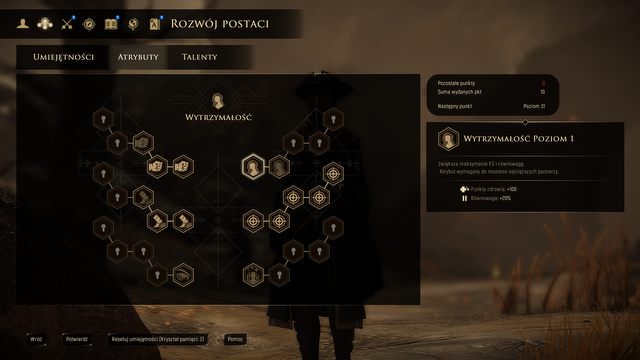
GreedFall doesn't reward you with experience points too generously. Every decision has to be carefully thought out.
Freedom in performing quests is also somewhat questionable. In a perfect role-playing game everything should depend on your preferences, discoveries and ideas – this was the case during the famous quest with monastery in Kingdom Come Deliverance. In GreedFall we seem to have total flexibility in the approach of completing quests, but in most cases it's limited to numbers and stats or linear boundaries.
The limitations in dialogue options while playing a character with low charisma are obvious and understandable, but the game didn't allow me to sneak into the room, despite the discovery of an appropriate pathway – all because at the very beginning of my adventure I invested my talent point in other attribute than agility. GreedFall's approach to character development is really very restrictive, and choosing one attribute usually means giving up everything else completely.
Our hero simply cannot be even a little bit versatile. Skill points that allow you to develop your talents are granted one by one and just every few levels. In the further part of the game, when you understand all mechanics and can consciously choose skills that allow you to use better rifles or heavy swords, it makes sense, but at the very beginning, when you discover all in-game features, it evokes a feeling of some artificial barriers.
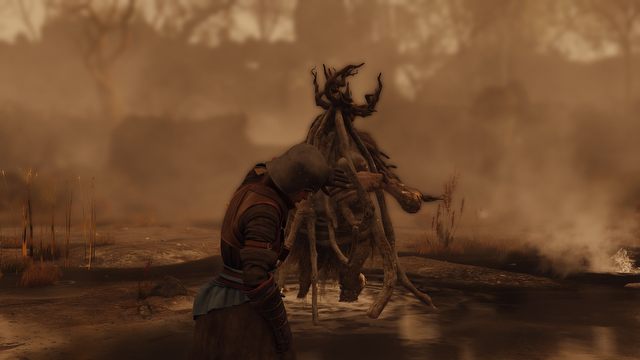
At Crooked Swamps you can even find a similar witch. The game doesn't try to cover its sources of inspiration.
Game designers probably came to the same conclusion, because they added the possibility to reset all your talents and skills. I even had to use this option to complete one quest related with the main story. Such a solution is probably supposed to encourage players to perform side quests, thanks to which you may advance much faster. For many people it can be considered as a challenge that gives a lot of satisfaction, although it may take some time to figure out which fighting or rather playing style suits you best.
Fight against time which doesn't expire
Generally, everything that is cool and interesting takes place quite late in GreedFall, after many hours spent in the game world. It looks like a work over the committee where first stages were developed by freelancers and endgame content by experienced designers. The plot absorbed me only somewhere around the middle of the road, the dialogues became more interesting with time. It may take some time to find out what stats you should develop. For example, you learn about important stats required to equip most powerful weapons in later stages of the game. Same goes with access to skills and abilities which make battles much more dynamic.
Due to stiff animations and generally poor responsiveness of my character I avoided direct combat by using shotguns. Sometimes I even got jammed or blocked on small stones. Close encounters, however, cannot be completely eliminated, because you often end up being surrounded by enemies in narrow corridors or small arenas. Only with time you may unlock a dodge with a roll or even a stronger kick. These abilities will turn melee combat into a much enjoyable experience. In general it's not that bad. An active pause and the ability to strengthen yourself with different potions allow you to experiment longer than it takes to discover all kinds of enemies.
A photocopied world?
Continuous battles with just a few types of enemies are the most negative hallmark of GreedFall – it looks like a roller-coaster of repetitive assets. The game world is basically made of one city and surrounding woods, which have been copied and pasted over many times in order to enlarge the entertainment playground. This is most visible in largest cities of Teer Fradee and their governors' residences, where the only difference is the length of stairs leading to them.
You always enter the same building, with the exact same layout of rooms, furniture and paintings on the walls. What a deja vu. Small cottages of natives in villages have identical decorations. It spoils game's atmosphere a little bit and ruins the immersion. With only three palaces and a few bungalows, devs could at least design some minor unique differences. One environmental puzzle also gets repetitive.
Surprisingly, such repetitiveness doesn't disturb at all while crossing through the wilderness. Although they are always only rocky mountains and autumn forests, nature in every area looks convincing and natural. The landscape does not get boring because it is surprisingly beautiful. GreedFall landscapes are one of the best that can be admired in modern video games, and it's strange that the same developers designed such ugly faces of characters.
A little rough, but with a style
All other defects of GreedFall are mainly technical issues and a general lack of final polishing. Some are common bugs, some are somewhat annoying mechanics and solutions. Fast travel used through something resembling an intermediary hub is a bit itchy, which results in a much larger number of loading screens than a typical player would accept. After entering the room, the doors close behind us every time, enemies often get jammed in the middle of the arena and do not move until they die, and if we have chosen a woman as a hero, in many dialogues we will still be considered as... a male. You can also add a bit deserted cities, where there are no crowds like in Assassin's Creed series. There is no denying that the newest game of Spiders has some flaws, but I would be far from calling GreedFall a stiff spiritual successor of Gothic.
After several hours of playing the game, I really have a feeling that this is a bit less polished The Witcher 3, which also had a lot of bugs after its premiere. Perhaps there was no hero as expressive as Geralt and a story of Bloody Baron, but everything else works. Beautiful locations, extensive quests, interesting side activities, lots of choices, rich mythology and history of the island as well as brilliant storyline that puts a great emphasis on careful character development make GreedFall a memorable title. And for the lack of dividing the story into DLC episodes or expansion sets, for the lack of paid premium content and the brutal unavailability to continue the game after ending credits, developers should receive a special award. After all, they deserve it!
ABOUT THE AUTHOR
I spent over 30 hours with GreedFall, ignoring a lot of side quests. At first I was quite skeptical about the game, but in the end I got involved and I couldn't resist the world of Teer Fradee. Despite the bugs, this is a much better role-playing game than The Sinking City which I have experienced earlier this year. You don't have to be a fan of Gothic and Piranha Bytes to enjoy GreedFall – if you like role-playing games, you should give it a try.
DISCLAIMER
We received a copy of Greedfall free of charge from official distributor.
GreedFall
GreedFall Review - Budget Witcher 3 That Simply Works
GreedFall is not a stiff spiritual successor to Gothic series. It's a well-designed unique role playing game developed with a limited budget and some great ideas borrowed straight from the best titles of this genre.
